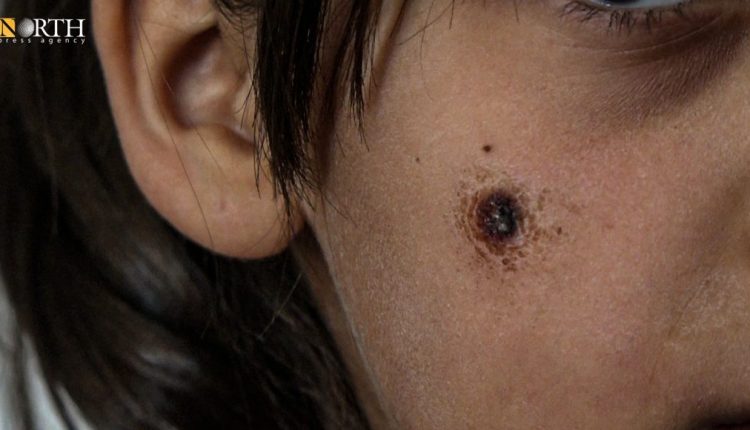
By Fattah Issa
MANBIJ, Syria (North Press) – People of Manbij, northern Syria, face a growing health crisis as the number of leishmaniasis cases continues to rise, overwhelming the local population. This is due to a reduction in support for effective prevention and treatment measures.
Without proper prevention methods such as insecticide spraying and raising awareness, the sandfly that spreads the disease has thrived, leading to more cases of leishmaniasis.
In a small room at a health care center in Manbij, residents gather to receive the necessary doses to treat leishmaniasis.
Ali Hussein, from the village of Arab Hassan in the northern countryside of Manbij, recounts the harsh suffering he endures because of leishmaniasis, locally known as “Aleppo boil,” a parasitic disease spread by the bite of phlebotomine sandflies.
Hussein indicates that he received five shots for the infected areas in his body, in addition to 16 intramuscular injections, and he still needs four others to complete the treatment.
Rise in infections
Adnan Halo, from the countryside of Manbij, shares a similar plight to Hussein’s, as he is forced to travel 25 kilometers to receive treatment.
He says that the swamps spread in the villages of al-Dandaniyah and al-Jamousiya where he resides, exposed him and his son, along with other people in the village, to leishmaniasis.
He calls for the spraying of outdoor insecticides to get rid of the sandflies and reduce the number of infections, pointing out the increasing cases in his village compared to previous years.
Meanwhile, Saad al-daraj, from the western countryside of Manbij, confirms that villages along the Sajur River witness high infection rates, adding that in every house there is at least one or two infections.
He says that his daughter and his niece are infected with leishmaniasis, forcing him to come to the health center regularly to receive treatment, noting that the center provides free treatment, but the long distance weighs on them.
The man points out that villages near the Sajur River, numbering more than twenty villages, need insect control, stating that a large number of children in these villages are infected with leishmaniasis.
Risks
Qusai Shahada, Director of the Healthcare Center in Manbij, expresses his concern over the increase in infection cases in 2024, noting that in previous years infections were limited to specific areas.
He adds that in 2023, the number of infected cases reached 14,330, while cases in the first quarter of 2024 reached 6,500, including 950 new cases.
Shahada adds that several factors contribute to the hike in infections, including a lack of health awareness, having many swamps and open drains, and unorganized sewage system in residential areas, in addition to the absence of preventive measures.
He says the Health Board Autonomous Administration of North and East Syria (AANES) in Manbij is taking several measures, including providing free treatment and monitoring the infected cases.
He notes that they are concerned about a possible increase in cases with the approaching summer.
Support
Alaa al-Mawas, a supervisor of the leishmaniasis control department at the Environment Board in Manbij, indicates that their efforts to combat the disease began in 2018 as they received support from specialized organizations.
With the beginning of 2020, this support decreased, affecting the department’s resources and limiting their ability to intervene effectively, he adds.
Al-Mawas points out that Manbij and its surroundings have become infected with the disease due to the lack of support.
They are preparing to spray insecticides in around 12,000 houses in the affected areas of Manbij with support from a humanitarian organization, according to al-Mawas.
He stresses they urgently need support from relevant authorities and other humanitarian organizations. They need insecticides to be able to spray approximately 80,000 houses in the affected areas.
